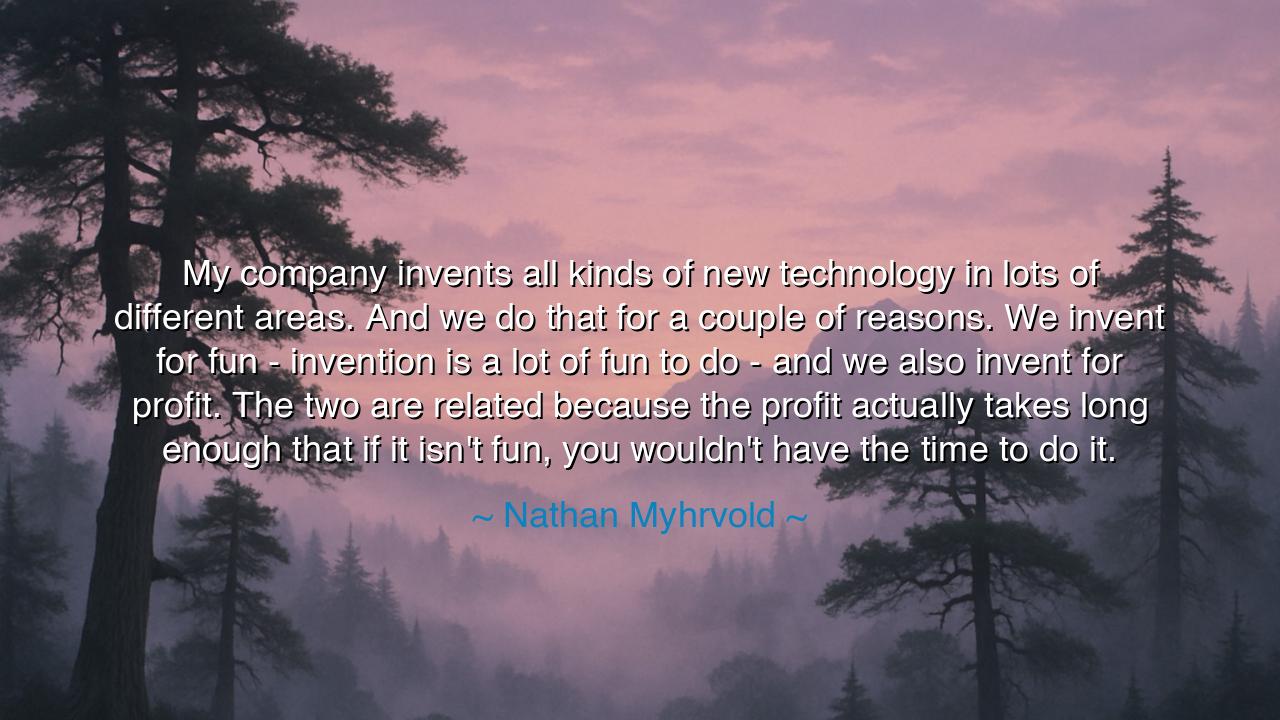
My company invents all kinds of new technology in lots of
My company invents all kinds of new technology in lots of different areas. And we do that for a couple of reasons. We invent for fun - invention is a lot of fun to do - and we also invent for profit. The two are related because the profit actually takes long enough that if it isn't fun, you wouldn't have the time to do it.






Hear now the words of Nathan Myhrvold, inventor and thinker of the modern age, who proclaimed: “My company invents all kinds of new technology in lots of different areas. And we do that for a couple of reasons. We invent for fun – invention is a lot of fun to do – and we also invent for profit. The two are related because the profit actually takes long enough that if it isn’t fun, you wouldn’t have the time to do it.” In this saying is revealed the twin engines of creation: the joy of discovery and the reward of sustenance, each bound together like flame and fuel.
For the act of invention is no simple task. It is a long journey of trial and error, of failures that humble and sparks that ignite only after countless nights of toil. To walk such a path without delight is to march in darkness, and no man endures long without light for the soul. Thus Myhrvold teaches: invention must first be fun, a source of wonder, play, and curiosity, or else the inventor will abandon the road before its end. Profit comes later, not as an immediate prize, but as the fruit that ripens slowly, nourishing the one who had the patience to wait.
Consider, O listener, the story of Thomas Edison, who through a thousand failed experiments sought to harness the electric light. Many mocked him, many would have despaired—but Edison found joy in each attempt. “I have not failed,” he said. “I’ve just found 10,000 ways that won’t work.” This is the spirit Myhrvold describes: if invention were not fun, Edison could not have endured. And when the profit at last arrived, it was not the coin alone that mattered, but the triumph of a vision born from delight and carried by perseverance.
So too in the halls of ancient Greece, Archimedes found joy in the puzzles of the world. When he stepped into his bath and discovered the principle of displacement, he leapt crying, “Eureka!” Not for wealth, but for the thrill of discovery. And yet, his discoveries brought prosperity to Syracuse, tools of war and marvels of engineering. Thus we see: fun gives birth to insight, and from insight comes profit, whether in coin, in safety, or in glory.
Yet beware, for Myhrvold’s wisdom carries a warning. If one seeks only profit, invention becomes a burden, a weary chase after numbers. Without joy, the spirit withers long before the reward arrives. And if one seeks only fun, without discipline, the work never bears fruit. It is the union of the two—playfulness and purpose—that sustains the long labor of creation.
What lesson, then, shall we take into our own lives? That in any endeavor—be it invention, business, or art—we must find delight in the work itself. Let the act of learning, of building, of experimenting be a source of joy. For profit, whether in wealth, recognition, or success, will come slowly, if it comes at all. Only joy can carry us through the long years; only patience can bring the fruit to ripeness.
Therefore, O seeker, when you labor, ask yourself: Do I love this work? Does it spark my spirit even when no reward is near? If the answer is yes, then endure, for joy will sustain you until profit arrives. And if the answer is no, turn your path, for no coin can replace the hunger of the heart. As Myhrvold has taught, invention—and indeed all creation—must be both fun and fruitful. When these two walk together, no burden is too heavy, no journey too long, and the work of your hands may endure beyond your years.






AAdministratorAdministrator
Welcome, honored guests. Please leave a comment, we will respond soon